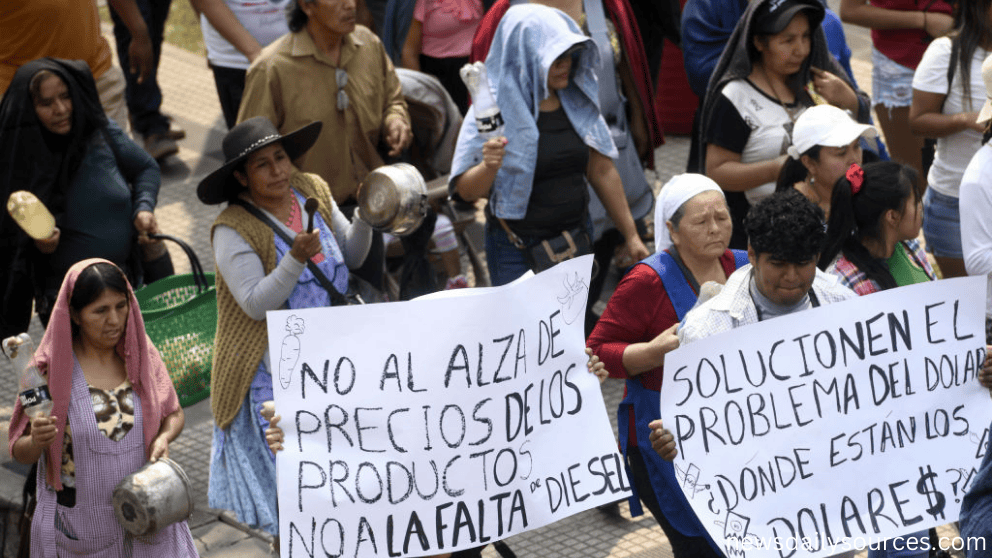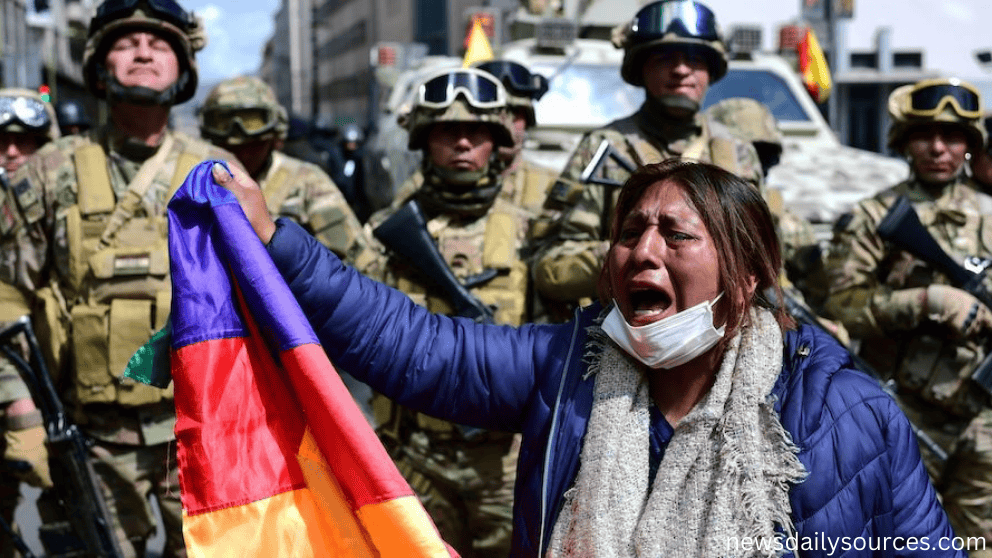Bolivia, a nation known for its tumultuous political landscape, faced yet another crisis as an apparent coup attempt unfolded on Wednesday. Armored military vehicles forcefully breached the doors of Bolivia’s government palace, threatening the administration of President Luis Arce. However, Arce swiftly took control of the situation, standing his ground against the insubordination and ordering the military to retreat. This event underscores the fragile state of democracy in Bolivia and highlights the ongoing political power struggles within the country.
The Coup Attemptn – A Breakdown of Events
Armored Vehicles Storm the Government Palace
On the fateful day, armored military vehicles rammed into the doors of Bolivia’s presidential palace, signaling a military intervention that sent shockwaves through the nation. The dramatic assault unfolded in the capital city, La Paz, as troops and tanks were deployed in the vicinity of the palace.
President Arce’s Defiance and Swift Response
Despite the apparent coup attempt, President Luis Arce remained resolute. In a video broadcast, he declared, “Here we are, firm in Casa Grande, to confront any coup attempt. We need the Bolivian people to organize.” Surrounding himself with ministers and supporters, Arce sent a strong message that his government would not succumb to military pressure.
Confrontation with the Rebel General
General Juan José Zúñiga, the army’s commander, appeared to be leading the rebellion. In a confrontation captured on Bolivian television, President Arce confronted Zúñiga directly, asserting his authority: “I am your captain, and I order you to withdraw your soldiers, and I will not allow this insubordination.” The firm stance taken by Arce was instrumental in de-escalating the situation.
Military Withdrawal and Public Resistance
Shortly after Arce named a new army commander, José Wilson Sánchez, the military forces began to retreat. The new commander swiftly ordered all mobilized troops to return to their barracks, thereby preventing the situation from escalating further. As the troops withdrew, thousands of Arce’s supporters gathered in the central square, waving Bolivian flags and celebrating the government’s survival.
Political Reactions and International Condemnation
The coup attempt was met with outrage both domestically and internationally.
Bolivia’s Labor Union Stands with Arce
The country’s largest labor union, recognizing the gravity of the situation, condemned the military’s actions and declared an indefinite strike. Social and labor organizations in La Paz vowed to defend the democratically elected government.
Regional and International Condemnation
Leaders from across Latin America, including Chilean President Gabriel Boric and the leader of Honduras, strongly condemned the attempted coup. The Organization of American States (OAS) also denounced the military’s involvement, reaffirming its commitment to democracy in Bolivia.
Underlying Issues – Economic Crisis and Political Infighting

The coup attempt did not arise in isolation. Bolivia has been experiencing mounting economic challenges and political discord that have contributed to unrest.
Economic Decline – From Prosperity to Crisis
Once one of South America’s fastest-growing economies, Bolivia is now grappling with economic instability. Inflation, a depleting foreign reserve, and declining exports have caused widespread discontent among the population, fueling protests and dissatisfaction with the government.
Political Divide – Arce vs. Morales
A rift has been growing between President Luis Arce and his former ally, Evo Morales. Morales, a leftist icon and former president, has been at odds with Arce over the leadership of the ruling Movement for Socialism (MAS) party. With the 2025 elections approaching, this power struggle is intensifying, contributing to political instability in the country.
Frequently Asked Questions (FAQs)
What happened in Bolivia’s government palace on Wednesday?
Armored military vehicles rammed into the government palace in an apparent coup attempt against President Luis Arce.
How did President Arce respond to the coup attempt?
Arce stood firm, confronted the army’s commander, and swiftly appointed a new military chief who ordered troops to withdraw.
Who was leading the coup attempt?
General Juan José Zúñiga appeared to be leading the rebellion, but he did not explicitly declare it as a coup.
What role did the Bolivian people play in the incident?
Supporters of Arce gathered in large numbers, waving flags and celebrating the retreat of the military, showing their support for the democratic government.
How did Bolivia’s labor unions react?
The country’s largest labor union condemned the coup attempt and declared an indefinite strike in defense of the government.
What was the international response to the coup attempt?
Regional leaders, including the president of Chile and the Organization of American States, condemned the coup attempt and expressed support for Bolivia’s democracy.
What economic challenges is Bolivia currently facing?
Bolivia is experiencing inflation, declining exports, and a depletion of foreign reserves, leading to economic instability.
How does the political rivalry between Arce and Morales affect Bolivia?
The rivalry between the two leftist leaders has caused division within the ruling party, contributing to political instability and uncertainty ahead of the 2025 elections.
Conclusion
The coup attempt in Bolivia was a stark reminder of the fragility of democracy in the country. Despite the military’s aggressive move, President Luis Arce’s unwavering stance ensured the continuity of his government. However, the underlying economic struggles and political discord remain pressing issues. Moving forward, Bolivia must address these challenges to ensure long-term stability and prevent further attempts to undermine its democratic institutions. The world watches as Bolivia navigates this critical juncture in its history.

